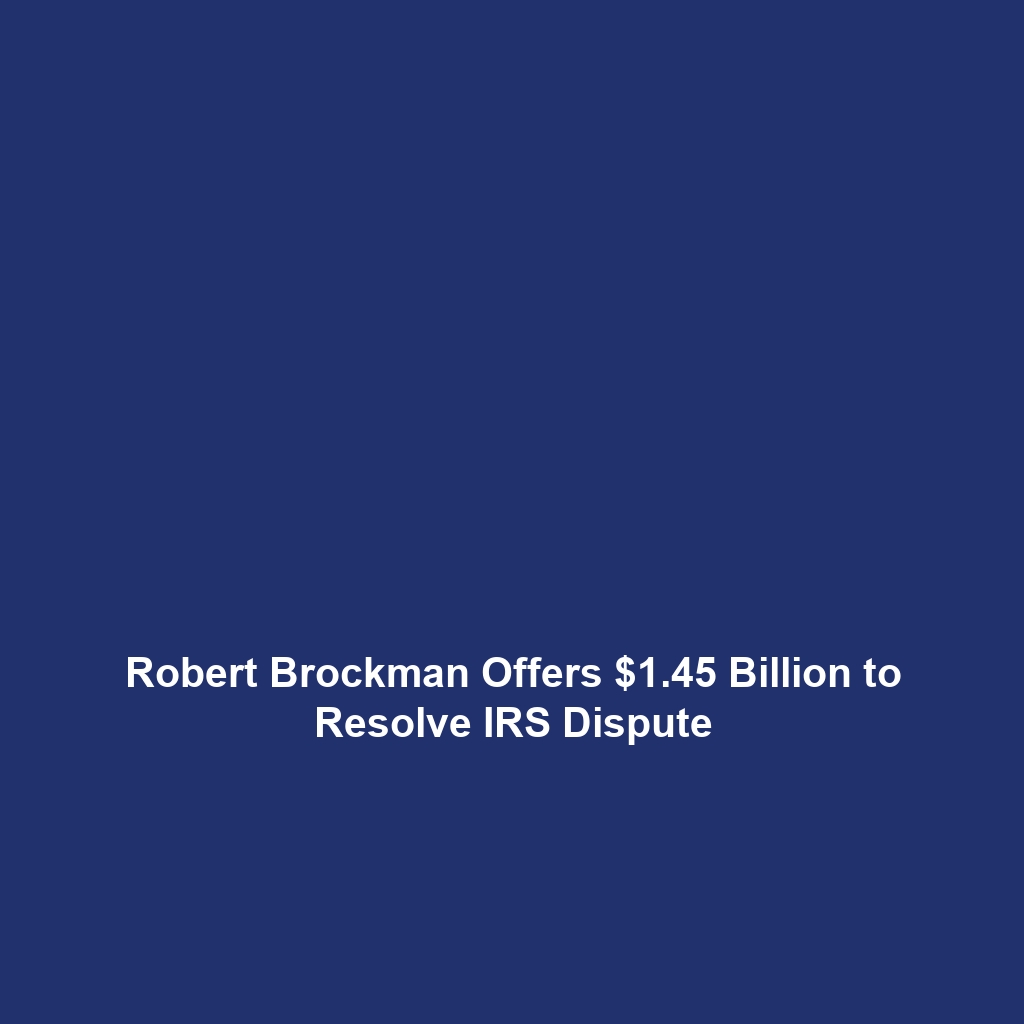Your cart is currently empty!
Tag: offshore accounts

Brockman’s $2 Billion Tax Case Sparks Debate Over IRS Oversight
Brockman’s $2 Billion Tax Case Sparks Debate Over IRS Oversight
Brockman’s $2 Billion Tax Case Sparks Debate Over IRS Oversight
In a landmark case that has captured national attention, the $2 billion tax fraud allegations against Robert Brockman, former CEO of Reynolds and Reynolds Co., highlight significant flaws in federal tax compliance and enforcement mechanisms. This case has raised questions not only about Brockman’s actions but also about the efficacy of the Internal Revenue Service (IRS) and its oversight capabilities.
Background of the Case
Robert Brockman was indicted in July 2020 for orchestrating a massive tax evasion scheme, which reportedly spanned over a decade. According to the indictment, Brockman is accused of hiding $2 billion in income from the IRS by creating a complex web of offshore accounts and trusts. The U.S. Department of Justice alleges that Brockman used these tactics to avoid taxation on substantial profits he generated through the sale of software and technology companies.
Federal prosecutors have characterized the case as one of the largest tax fraud cases ever brought against an individual in the United States. The gravity of the situation is compounded by the fact that Brockman, aged 80, is now facing trial, which raises numerous legal and ethical questions regarding the timeline of investigations and prosecutions for such substantial cases of tax evasion.
IRS Oversight Under Scrutiny
The Brockman case has prompted a scrutiny of the IRS’s oversight and enforcement capabilities, particularly regarding high-profile and wealthy individuals. While the IRS utilizes various methods to monitor and enforce tax compliance, critics argue that the agency has been underfunded and overburdened, leading to difficulties in effectively tracking vast networks of offshore finances.
Tax compliance expert Professor Michael Graetz, from Columbia University, commented, “The IRS has historically struggled with cases involving complex financial structures. It often lacks the resources to fully investigate such extensive fraud schemes unless they come to light through other means.”
Legal Implications and the Broader Context
As the Brockman case unfolds, it serves as a critical reference point for understanding how tax fraud is prosecuted in the United States. Legal experts warn that the case may set significant precedents concerning the government’s ability to enforce tax laws against wealthy individuals.
Legal analyst Sarah Smith stated, “This case reflects a growing trend of the federal government taking a firmer stance against tax evasion, especially among those with complex financial portfolios. How the court rules will likely influence similar cases going forward.”
The implications of the case extend beyond just the immediate legal outcomes. It raises essential questions about fairness in the tax system. For many middle-class Americans who may not have similar resources to shield their income, the case serves as a stark reminder of potential inequities in federal tax policies.
Public Reaction and Legislative Considerations
Public response to the Brockman case has been polarizing. Many view it as an opportunity to push for tax law reform, emphasizing the need for a more robust IRS with sufficient resources to pursue tax evasion aggressively. There is an increasing call for transparency in how the IRS handles audits, especially concerning its wealthy taxpayers.
A report from the Treasury Inspector General for Tax Administration noted that the IRS’s audit rates for high-income earners have significantly decreased in recent years, leading to concerns about whether the agency can adequately enforce existing tax laws. This has led to calls from various advocacy groups for increased funding to ensure that the IRS can effectively carry out its mandate, ultimately benefiting public trust in the tax system.
Future Implications for the IRS and Tax Law Enforcement
As the Brockman case proceeds, it could spur a reevaluation of how the IRS operates, particularly regarding enforcement against high-net-worth individuals. Lawmakers are under pressure to consider comprehensive tax reform that could address vulnerabilities in the existing system.
Economic policy expert Dr. Emily Kaufman emphasized, “The Brockman case underscores the critical need for a tax system that is equitable, ensuring that individuals cannot use their resources to circumvent their legal obligations. It’s a wake-up call for both the IRS and Congress.”
Conclusion
The Brockman tax fraud case is not just about the legal fate of one individual; it is a reflection of broader systemic issues within the IRS and the federal tax system. It raises essential questions about compliance, enforcement, and fairness in tax policies, spurring debate among policymakers, experts, and the public. As the case unfolds, all eyes will remain on the legal proceedings, the IRS’s response, and the potential reforms that may arise in the aftermath of this high-profile tax fraud allegation.

Robert Brockman Offers $1.45 Billion to Resolve IRS Dispute
Robert Brockman Offers $1.45 Billion to Resolve IRS Dispute
Robert Brockman Offers $1.45 Billion to Resolve IRS Dispute
Billionaire businessman Robert Brockman has proposed a $1.45 billion settlement to address ongoing tax disputes with the Internal Revenue Service (IRS). This offer comes amid serious allegations of tax fraud and evasion, which have been a focal point of a legal battle that has garnered significant media attention.
Background of the Case
Robert Brockman, who made his fortune in software and technology industries, faces multiple criminal charges alleging that he concealed more than $2 billion in income from the IRS over the years. The charges, filed in 2020, include tax evasion, wire fraud, and other serious offenses related to a complex scheme that allegedly involved offshore accounts.
The case has been complicated by Brockman’s legal strategy and claims of declining health, as he has sought to delay proceedings citing medical issues. His legal team has consistently argued against the government’s claims, asserting that the accusations lack substantive evidence.
Details of the Settlement Proposal
Brockman’s recent offer to settle the disputes stems from an effort to resolve IRS liens placed on his assets as the litigation continues. The proposal, if accepted, would amount to one of the largest settlement offers made in the history of disputes involving the IRS.
According to sources close to the negotiations, the settlement would allow Brockman to pay off the liens and avoid further penalties while also enabling the IRS to recoup a substantial portion of the alleged tax liabilities. This could potentially lead to a quicker resolution of the case, sparing both parties from a prolonged court battle.
Implications of the Settlement
If the IRS accepts the $1.45 billion offer, it may signal a shift in how the agency approaches large-scale tax fraud cases, emphasizing settlement over drawn-out litigation. Legal experts suggest that a successful resolution could pave the way for more settlements in similar high-profile cases.
“Settlements can benefit both parties,” said tax attorney and expert Robert L. Cohen. “For Brockman, it provides him with a way to move forward and potentially restore his reputation, while for the IRS, it ensures they recover funds without the uncertainty of a trial.”
Reactions to the Proposal
The proposal has received mixed reactions from the public and legal analysts. Supporters of Brockman argue that he deserves a chance to resolve his issues without the additional burden of a protracted trial, while others criticize the significant amount he is willing to pay as just a fraction of what he allegedly owes.
“This proposal could be seen as an admission of guilt, but it may also be a pragmatic step for both sides,” commented legal analyst Jennifer H. Roberts. “The complexities of tax law and litigation can be daunting, and this might be the best way to achieve a resolution.”
Next Steps in the Legal Proceedings
The IRS has yet to respond formally to Brockman’s settlement offer. The agency typically takes time to consider such proposals, weighing the implications of accepting or rejecting an offer of this magnitude. Depending on their response, a timeline for resolution may be established, although significant delays could still occur as legal reviews are conducted.
As the case continues to unfold, many are watching closely to see how it may influence future settlements in other high-value tax disputes. With public interest high and the stakes at play, the outcome of this case could have wider ramifications for billionaires facing similar legal challenges.
Conclusion
Robert Brockman’s $1.45 billion proposal to settle his IRS disputes represents a significant development in his ongoing legal battle over tax fraud allegations. While it remains uncertain whether the IRS will accept the offer, this case highlights the complexities and potential resolutions inherent in high-stakes tax litigation.
As both parties navigate this crucial juncture, the resolution of Brockman’s case could have lasting implications beyond his personal circumstances, potentially influencing the broader landscape of tax enforcement policy and public perception of wealthy individuals facing similar allegations.